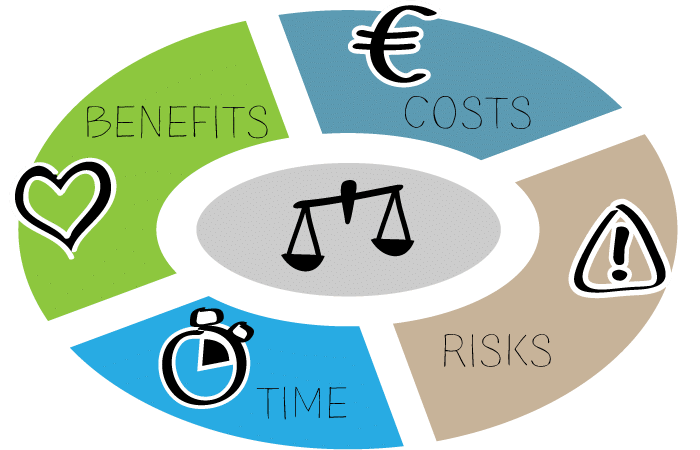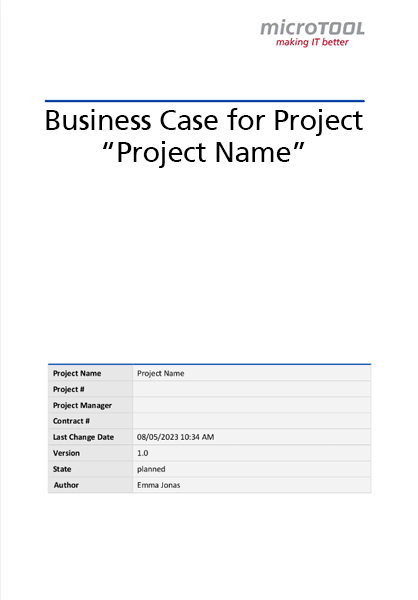Business Case. Evaluate the Benefits, Costs and Risks of a Project.
What are business cases? What advantages do they offer? And how is the associated document created?

A business case evaluates benefits, costs and risks of a new project and considers the schedule, as well. It serves as the foundation for the approval or rejection of a project proposal.
The business case is a central element in many project organizations, because it also serves as a justification of the current project. The business case is regularly revised and updated.
What Is a Business Case?
At the beginning of every project, there is the why. Why should the business carry out a new project? What benefits can be gained from it? And are the costs worthwhile? A business case tries to answer these questions. It argues why the project would be beneficial, which costs, benefits and risks the new investment would have. The benefit can be financial, but it can also consider other criteria such as workload or increased satisfaction. A business case supports itself on figures for this argument, for example, the expected cost reduction in a percentage or a cash flow account. The decision makers can then approve or reject the project proposal.
Questions that a business case answers:
- Why should we carry out the project? What happens if we don’t?
- What economic benefits could we achieve for the organization?
- What are the risks?
- How high is the potential cost?
- How long will the project take?
Business Case According to PRINCE2
The business case can serve not only as the foundation for the approval of a project, but also as an ongoing commercial justification. This is how it is stipulated by the project management method PRINCE2. Here, the business case is revised in regular intervals and, based on this information, it is checked whether the project is still worthwhile up to the current state. This way stakeholders and sponsors can always get current information on the state of the project.
A business case according to PRINCE2 evaluates whether a project is:
- desirable,
- viable,
- achievable and
- a worthwhile investment.
A short definition of the business case:
A business case evaluates the benefits, costs and risks of a new project. It serves as the foundation for the approval or rejection of a project.
In PRINCE2, the business case is the most important document: not only is the project proposal examined based on it, a running project is also justified with it. Because the business case is regularly checked and updated.
What Are the Advantages of the Business Case?
Reliable Decision-Making
Effects of the project on the success of the business are clearly displayed.
Leeway for Decision-Making
More options and their effects are explained.
Comparability
Business cases can be compared with other business cases.
Liability and Responsibility
The business case is normally given to the management as a document that clearly shows the authors and the reason for their decisions.
Overview
Financial and non-financial criteria are included as project appraisals.
Transparency and Traceability
Derivation of figures is constantly discernible.
Risk Recogintion
Risks can be recognized early on and counter-measures initiated.
Concept Optimization
Through the detailed analysis of available information, holes in the project concept can be revealed.
Knowledge to go
How Do You Create Business Cases?
To create a business case, carry out a detailed business case analysis. The business case is “just” the result of your research. In this research you determine why a new project or a new investment is necessary, which benefits and costs are expected. You have to determine data sources that support your business case, for example, internal financial information, case studies of similar projects or industrial analyses. In a business case analysis, possible alternatives to the project and the associated risks are also examined. And then you have to formulate your analysis into a business case. Simply considered, this is at first just a suggestion. So it doesn’t necessarily have to be strictly adhered to – an oral report is sufficient. Of course, this method is not recommended for complex problems, in such cases, the creation of a document that presents a overseeable summary of all the information is needed. How would such a document look?
Structure of a Business Case According to PRINCE2
To start off, one thing: There is no standardized template for business cases. However, there are many suggestions – actual guidelines are only really offered by PRINCE2. According to this project management method, the business case consists of the following sections:
- Executive summary: A short overview of the business case
- Reasons: Motivation for carrying out the project
- Business options: Possibilities for carrying out the project wth quantitative and qualitative evaluations
- Expected benefit: List of benefits with reasons and measurements
- Expected dis-benefits: Results that are negatively evaluated by stakeholders or negative side effects
- Timescale: Beginning and end of the project and when the project will pay off
- Cost: Costs of the project and costs that arise after its completion
- Investment appraisal: Information about the return of investment (ROI); cost-benefit analysis
- Major risks: Summary of the largest risks for the project
Additionally, there is a section about the purpose and scope at the beginning of the document. As well as this information, formal elements should also be considered. The title has to be expressive and the author named. Because a business case goes through many hands and is always being checked or revised, editors and dates should also be entered onto the sheet. That way you always know who changed or approved which version on which day.
Detailed Content of the Business Case
Executive summary
Just like in other reports, the summary represents the most important sections in the business case: decision makers will immediately have a look at it. Normally, the summary is created at the very end. It should explain
- the problems that the project should solve,
- which conditions have been considered,
- which benefits and return of investment are expected,
- how many resources are required to complete the project,
- what the strived-for result looks like.
Reasons
Depending on the type of project, the motives for carrying it out vary. If, for example, a new legal provision influences your business, then this is a reason to lead a new project on the path. Or if you want to develop new software, detail this as a motivation in this section of the business case.
Business options
A project suggestion always represents one possible solution for the problem. There are always alternatives. According to PRINCE2, three options must always be considered in the business case:
- Do nothing (maintain status quo)
- Do the minimum
- Do something
This scenario is evaluated according to quantitative and qualitative measures. That means: which monetary consequences do these options entail? And what other effects that can’t be expressed in figures will result? The options Do the minimum and Do something usually have to be examined through a business case analysis.
Expected benefit
The expected benefit of your project has to be measurable, so that the results can be compared after the completion of the project. For example, in this section of the business case, you reveal that you are expecting a cost reduction of 30% as a benefit. Apart from this, you should define at what point you expect the benefit.
Expected dis-benefits
Enter here the effects of the project that are felt to be negative by the stakeholders. Note that negative effects are not risks. They represent consequences that are certainly involved in an activity. A risk, on the other hand, is not always connected with a likelihood – it might, but will not necessarily, occur.
Timescale
Here, enter how long the project should last and when the benefits are expected. Apart from this, you should also explain when the project will pay. That is why this section includes information that reaches beyond the actual duration of the project.
Cost
This section of the business case contains all the costs of the project. Furthermore it also considers the costs that the project entails after its completion, like maintenance costs, for example.
Investment appraisal
Under investment, you compare the benefits and the expected negative effects with the risks and costs of the project. Here you use methods like, for example, cash flow calculation or capital value. The goal is to be able to confirm the value of the project as an investment. The foundation for the calculation is formed by the data from the sections about costs and benefits in the business case.
Major risks
Apart from costs and benefits, risks are an important decision making tool. That is why the largest risks and their likelihood of occurring have to be sketched here in the business case, as well as the countermeasures. Here, an overview is enough – further details about risks are recorded in other documents.
Create decision-making tools for your projects
The business case is very well suited to get an overview of the essential success factors of a project: costs, benefits and risks. It forms a foundation to be able to make safe decisions on. But how can you create these documents easily? And how can you ensure traceability and versioning if the document is revised and taken by many different people? Use a tool that offers a Word template according to PRINCE2, a tool that you can manage the document with. Every change and every editor is then automatically recorded – and all that can be carried out within the tool with a click.

